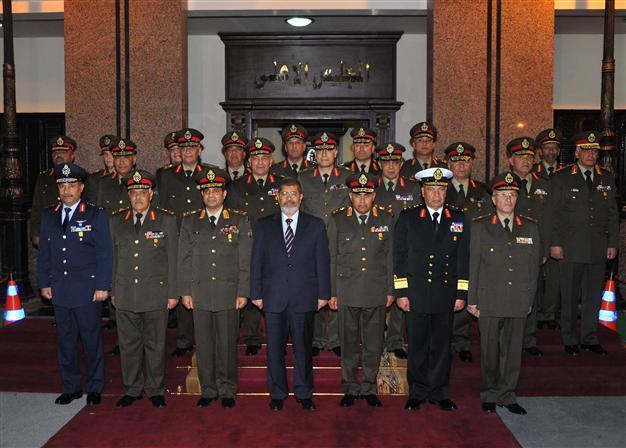Morsi, Egypt army close ranks against abuse charges
CAIRO - Agence France-Presse

In this Thursday, April 11, 2013 image released by the Egyptian Presidency, Egyptian President Mohammed Morsi, center, poses with military officers after a meeting with the Supreme Council of the Armed Forces in Cairo, Egypt. AP photo
Egypt's President Mohamed Morsi and the military have closed ranks to deny charges that soldiers had killed and tortured protesters, following leaks of an inquiry report implicating officers.Defence Minister Abdel Fattah al-Sissi, who is also army chief, denied in a statement aired on Friday that the military had committed abuses, after talks on Thursday night with Morsi, who had named the fact-finding inquiry last year.
"I swear, by God, the armed forces did not kill nor order killings; it did not act treacherously, nor did it order treachery," Sissi, standing next to Morsi, said in a televised statement.
Morsi in turn praised the armed forces for "protecting Egypt when it started its march on January 25," referring to the 2011 uprising which overthrew president Hosni Mubarak and ushered in interim military rule.
Egypt's press and Britain's Guardian newspaper have published leaks from the report by the fact-finding panel, named shortly after Morsi took office last June, implicating the military in killings, torture and disappearances.
According to a report in The Guardian, the inquiry found that army officers ordered doctors to treat wounded demonstrators without anaesthesia after they clashed with soldiers during protests against military rule in 2012. The inquiry also reportedly documented cases of soldiers committing killings and torture during the 18-day uprising which overthrew Mubarak in early 2011, after he had deployed the military to try to quash the unrest.
In early January, the committee submitted its report to Morsi, who referred it to a "revolutionary prosecution" he created to investigate crimes during the revolt and under military rule.
It was not immediately clear whether the leaked sections were from drafts or the final report.
The New York-based lobby group Human Rights Watch on Friday urged Morsi to release the report, which he had ordered at a time of tensions with the military in 2012.
"Releasing the fact-finding report would be the Egyptian government's first acknowledgment of two years' worth of police and military abuses," Nadim Houry, its deputy Middle East director, said in a statement.
Despite reports in January that the inquiry would be published shortly, the report has been shrouded in secrecy, prompting some to accuse the government of suppressing the findings.
A presidential aide told AFP on Friday that the report detailed "16 new incidents, which have been assigned to 16 prosecutors to investigate." The presidency's responsibility over the inquiry ended when he referred the findings to the prosecution, the aide said.
"The presidency created the committee and assisted its work, but now it's in the prosecution's hands," he said.
On Thursday, Morsi promoted three army commanders in a show of support for the military during the meeting with the Supreme Council of the Armed Forces, which took charge after Mubarak's overthrow and before Morsi's election.
"I declare this to the entire world, I greatly appreciate the role of the military," said Morsi, flanked by generals, in the televised statement after the meeting.
Morsi took office with his powers circumscribed by the military, then led by Mubarak's former defence minister Field Marshal Hussein Tantawi.
Egypt's first civilian leader sacked Tantawi after an August militant attack killed 16 soldiers at a border post, seizing on discontent within the military to purge commanders whose loyalties were in doubt, an aide said at the time.
















